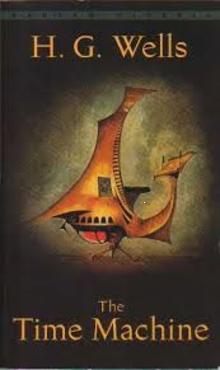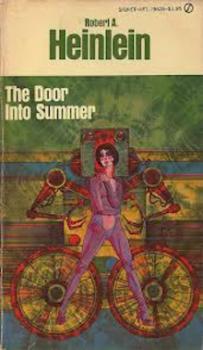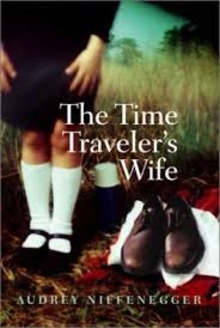Do You Have the Time?
 Spider Robinson, in his brilliant and moving story “The Time-Traveler,” pointed out that we’re all time travellers really. We’re all moving into the future at the rate of one second per second.
Spider Robinson, in his brilliant and moving story “The Time-Traveler,” pointed out that we’re all time travellers really. We’re all moving into the future at the rate of one second per second.
As those of you who read last week’s post might realize, Robinson’s talking – in a way – about a subjective experience. The protagonist of the story experienced the passage of ten years of time in a manner completely different from that of the rest of the world. To the other characters (and the readers) the present is merely the present, because they (and we) had experienced the intervening years in the normal way. Because the protagonist hadn’t, it felt to him as though he’d stepped ten years into the future.
If that sounds a bit confusing, I urge you to find the story (it’s collected in Callaghan’s Crosstime Saloon) and read it for yourself.
 Let’s face it, for the most part time travel is dealt with a little more straightforwardly, starting with HG Wells’s The Time Machine. Like most of Wells’s other fiction (along with others who were writing at the same time), this novel is as much social commentary as it is science fiction. When you think about it, however, when you’ve got time travel AND a future world, you’ve really got SF twice over.
Let’s face it, for the most part time travel is dealt with a little more straightforwardly, starting with HG Wells’s The Time Machine. Like most of Wells’s other fiction (along with others who were writing at the same time), this novel is as much social commentary as it is science fiction. When you think about it, however, when you’ve got time travel AND a future world, you’ve really got SF twice over.
I’ll be honest. It’s been so long since I’ve read Wells’s novel (or seen any of the many movies) that I don’t remember whether it introduced the idea of the time-travel paradox (What happens if you kill your own grandparent before your parent is born?), but it is a concern that comes up again and again in later novels and short stories that focus on time travel.
One of these is Heinlein’s The Door into Summer. In this novel, we’re given two methods of time travel. The first is cryogenics, a variation on the aforementioned “one second per second.” (Aside: Robinson is such a fan of Heinlein, you have to wonder if this gave him the idea) The protagonist, Dan Davis, decides to take the “Long Sleep,” and be frozen for 30 years. When he wakes up, he finds he loves the future, but there’s one little problem. Somehow he’s woken up poor. When he starts to investigate how this happened to him, he finds something rather surprising. His solution? Trick a scientist who’s working on a time machine into sending him back to his original time period so that he can set things right.
Oh, and at one point Dan does encounter his unconscious self, and he wonders what would happen if he cut his own throat.
That’s by no means Heinlein’s only foray into time travel. He explored the ramifications in many different short stories, including a little gem called “All You Zombies.” Here a bartender helps a young man down on his luck by sending him back in time, with a little time vortex thingy he’s got in his back room. The bartender seems to have a rather astonishing insight into the young man’s difficulties. Altogether, a really interesting take on the time travel paradox.
 Television has had its own ways of handling time travel. I can just barely remember The Time Tunnel, which was an early example of science gone wrong through government interference.
Television has had its own ways of handling time travel. I can just barely remember The Time Tunnel, which was an early example of science gone wrong through government interference.
Quantum Leap had a similar premise, in that its protagonist also became lost in time, but it had the added twist that he didn’t travel as himself, but temporarily took the place of other people in that time period. Since his primary purpose was to “put things right,” he resembles, in a very minor key, a time-travelling Doctor we all know.
More modern approaches, like Audrey Niffenegger’s The Time Traveler’s Wife, deal less with the mechanics or the historical impact of time travel and more on the personal or philosophical aspects. Since no real scientific explanation or basis is given for the protagonist’s ability to travel in time, this might almost be considered an urban fantasy – though I’m fairly certain there isn’t much time travel in traditional fantasy.
Niffenegger’s novel was also made into a movie, but it wasn’t tremendously successful. I’m afraid that it might have been too subtle and too delicate to be successful in today’s climate.
Violette Malan is the author of the Dhulyn and Parno series of sword and sorcery adventures, as well as the Mirror Lands series of primary world fantasies. As VM Escalada, she writes the soon-to-be released Halls of Law series. Visit her website <www.violettemalan.com
I take it you’ve a copy of the Vandermeer’s new anthology? 🙂
I admit I’m more familiar with Heinlein’s “By His Bootstraps” than “All You Zombies” — “Bootstraps” is a gem.
I also love Stephen Baxter’s The Time Ships — ostensibly a sequel to Wells’ Time Machine, but infinitely grander in its ultimate scope.
PrinceJvstin: no I don’t, but I’ll get my brother to order it for me.
Joe H: I was thinking of “By His Bootstraps” as one of the many stories in which Heinlein looks at time travel, and you’re right, it’s a real gem. I’ve heard of Baxter’s work, but I haven’t read it. Another one for my list.
The two examples of time travel in fantasy that spring to mind are Kate Elliott’s massive Crown of Stars series, with its wild explanation of what all those stone circles were really for, and Harry Potter and the Prisoner of Azkaban, with the time turner. Elliott gets pretty deep about the implications of time travel for her characters and their world.
[…] Do You Have the Time? […]
[…] is Heinlein’s classic “All You Zombies” which you may recall I talked about in my time travel post. It also happens to be a story set in a […]